Nursing law and ethics in nursing practice
VerifiedAdded on 2022/10/07
|11
|2883
|66
Assignment
AI Summary
This topic is about nursing law and ethics
Contribute Materials
Your contribution can guide someone’s learning journey. Share your
documents today.
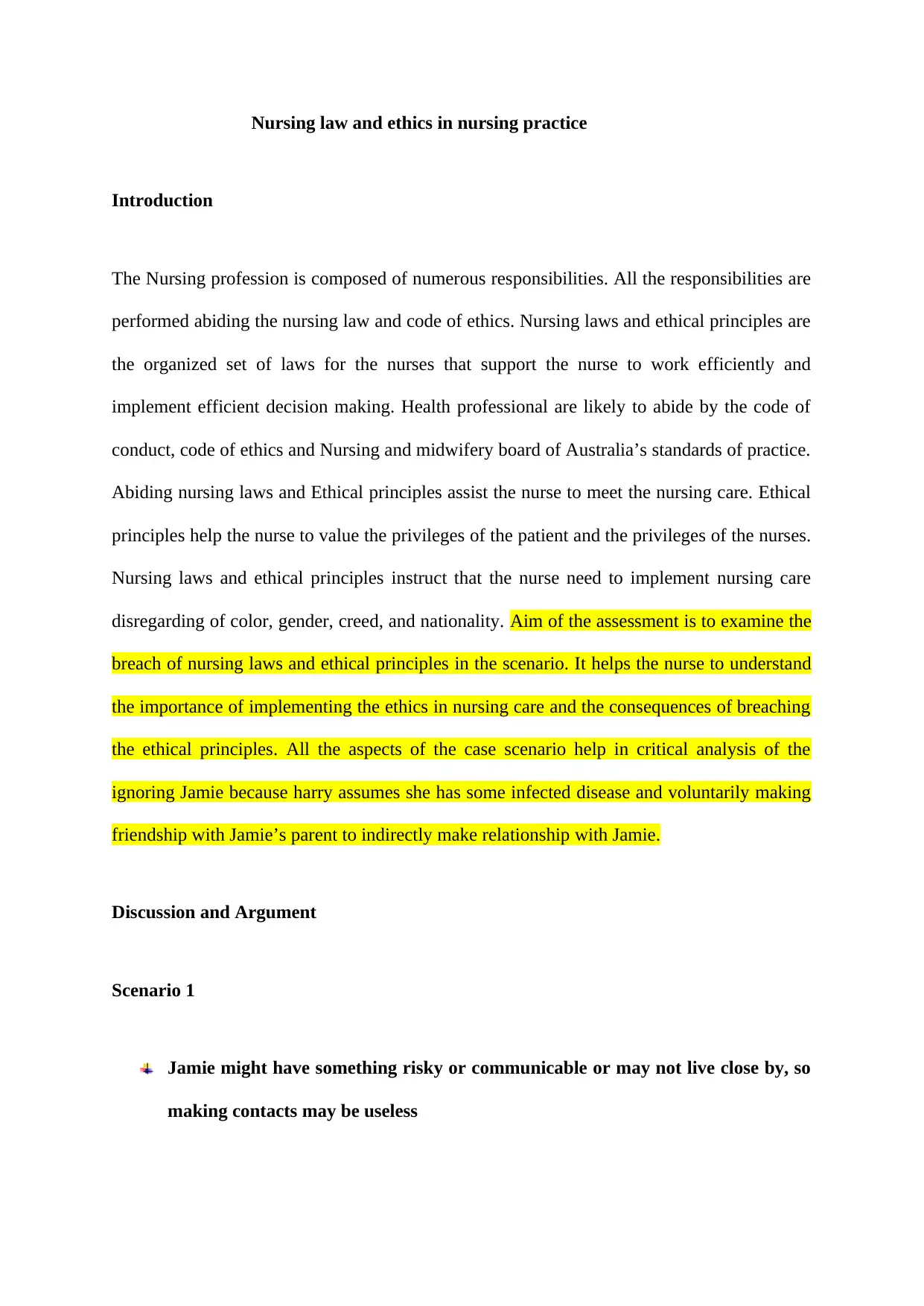
Nursing law and ethics in nursing practice
Introduction
The Nursing profession is composed of numerous responsibilities. All the responsibilities are
performed abiding the nursing law and code of ethics. Nursing laws and ethical principles are
the organized set of laws for the nurses that support the nurse to work efficiently and
implement efficient decision making. Health professional are likely to abide by the code of
conduct, code of ethics and Nursing and midwifery board of Australia’s standards of practice.
Abiding nursing laws and Ethical principles assist the nurse to meet the nursing care. Ethical
principles help the nurse to value the privileges of the patient and the privileges of the nurses.
Nursing laws and ethical principles instruct that the nurse need to implement nursing care
disregarding of color, gender, creed, and nationality. Aim of the assessment is to examine the
breach of nursing laws and ethical principles in the scenario. It helps the nurse to understand
the importance of implementing the ethics in nursing care and the consequences of breaching
the ethical principles. All the aspects of the case scenario help in critical analysis of the
ignoring Jamie because harry assumes she has some infected disease and voluntarily making
friendship with Jamie’s parent to indirectly make relationship with Jamie.
Discussion and Argument
Scenario 1
Jamie might have something risky or communicable or may not live close by, so
making contacts may be useless
Introduction
The Nursing profession is composed of numerous responsibilities. All the responsibilities are
performed abiding the nursing law and code of ethics. Nursing laws and ethical principles are
the organized set of laws for the nurses that support the nurse to work efficiently and
implement efficient decision making. Health professional are likely to abide by the code of
conduct, code of ethics and Nursing and midwifery board of Australia’s standards of practice.
Abiding nursing laws and Ethical principles assist the nurse to meet the nursing care. Ethical
principles help the nurse to value the privileges of the patient and the privileges of the nurses.
Nursing laws and ethical principles instruct that the nurse need to implement nursing care
disregarding of color, gender, creed, and nationality. Aim of the assessment is to examine the
breach of nursing laws and ethical principles in the scenario. It helps the nurse to understand
the importance of implementing the ethics in nursing care and the consequences of breaching
the ethical principles. All the aspects of the case scenario help in critical analysis of the
ignoring Jamie because harry assumes she has some infected disease and voluntarily making
friendship with Jamie’s parent to indirectly make relationship with Jamie.
Discussion and Argument
Scenario 1
Jamie might have something risky or communicable or may not live close by, so
making contacts may be useless
Secure Best Marks with AI Grader
Need help grading? Try our AI Grader for instant feedback on your assignments.
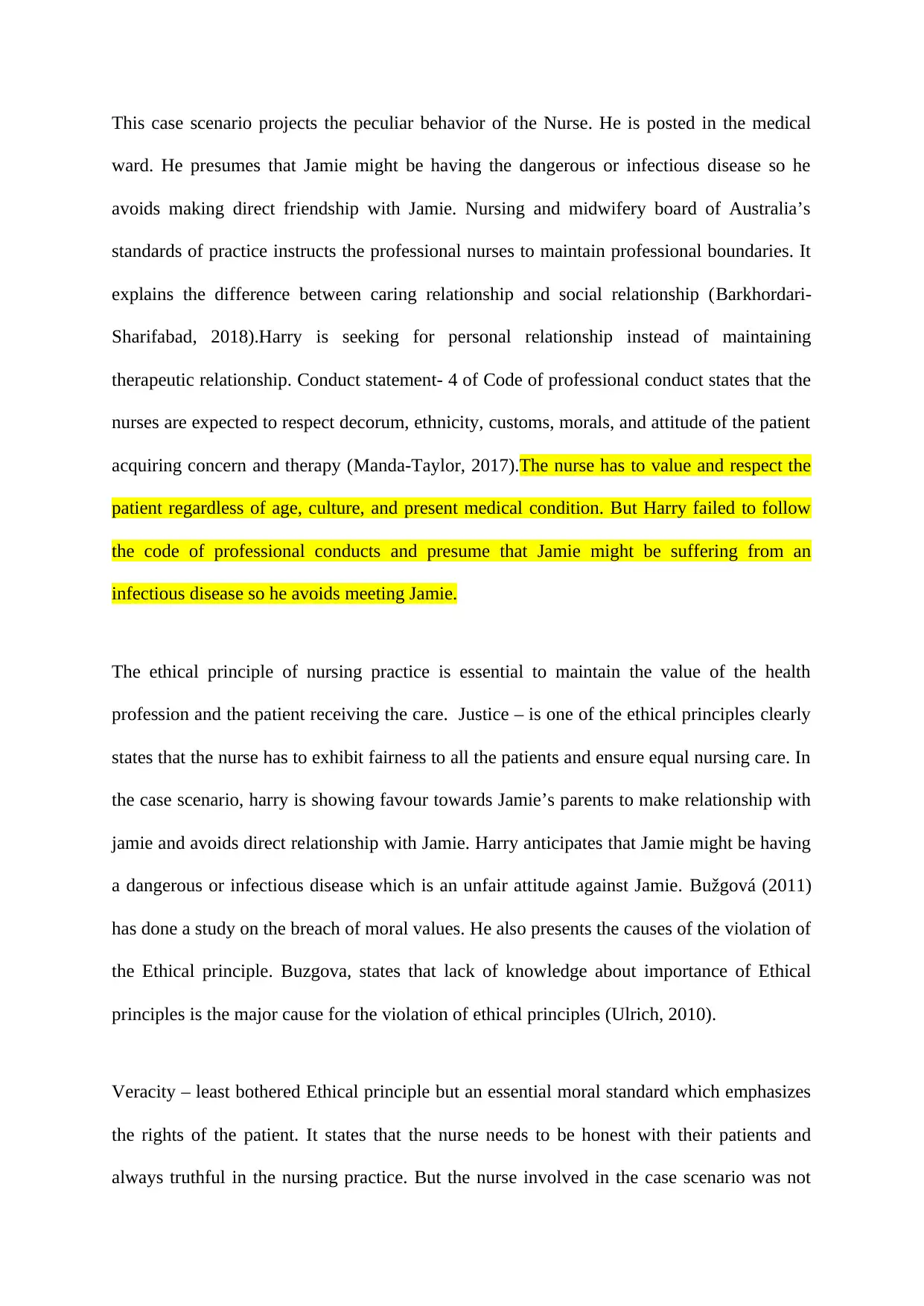
This case scenario projects the peculiar behavior of the Nurse. He is posted in the medical
ward. He presumes that Jamie might be having the dangerous or infectious disease so he
avoids making direct friendship with Jamie. Nursing and midwifery board of Australia’s
standards of practice instructs the professional nurses to maintain professional boundaries. It
explains the difference between caring relationship and social relationship (Barkhordari-
Sharifabad, 2018).Harry is seeking for personal relationship instead of maintaining
therapeutic relationship. Conduct statement- 4 of Code of professional conduct states that the
nurses are expected to respect decorum, ethnicity, customs, morals, and attitude of the patient
acquiring concern and therapy (Manda-Taylor, 2017).The nurse has to value and respect the
patient regardless of age, culture, and present medical condition. But Harry failed to follow
the code of professional conducts and presume that Jamie might be suffering from an
infectious disease so he avoids meeting Jamie.
The ethical principle of nursing practice is essential to maintain the value of the health
profession and the patient receiving the care. Justice – is one of the ethical principles clearly
states that the nurse has to exhibit fairness to all the patients and ensure equal nursing care. In
the case scenario, harry is showing favour towards Jamie’s parents to make relationship with
jamie and avoids direct relationship with Jamie. Harry anticipates that Jamie might be having
a dangerous or infectious disease which is an unfair attitude against Jamie. Bužgová (2011)
has done a study on the breach of moral values. He also presents the causes of the violation of
the Ethical principle. Buzgova, states that lack of knowledge about importance of Ethical
principles is the major cause for the violation of ethical principles (Ulrich, 2010).
Veracity – least bothered Ethical principle but an essential moral standard which emphasizes
the rights of the patient. It states that the nurse needs to be honest with their patients and
always truthful in the nursing practice. But the nurse involved in the case scenario was not
ward. He presumes that Jamie might be having the dangerous or infectious disease so he
avoids making direct friendship with Jamie. Nursing and midwifery board of Australia’s
standards of practice instructs the professional nurses to maintain professional boundaries. It
explains the difference between caring relationship and social relationship (Barkhordari-
Sharifabad, 2018).Harry is seeking for personal relationship instead of maintaining
therapeutic relationship. Conduct statement- 4 of Code of professional conduct states that the
nurses are expected to respect decorum, ethnicity, customs, morals, and attitude of the patient
acquiring concern and therapy (Manda-Taylor, 2017).The nurse has to value and respect the
patient regardless of age, culture, and present medical condition. But Harry failed to follow
the code of professional conducts and presume that Jamie might be suffering from an
infectious disease so he avoids meeting Jamie.
The ethical principle of nursing practice is essential to maintain the value of the health
profession and the patient receiving the care. Justice – is one of the ethical principles clearly
states that the nurse has to exhibit fairness to all the patients and ensure equal nursing care. In
the case scenario, harry is showing favour towards Jamie’s parents to make relationship with
jamie and avoids direct relationship with Jamie. Harry anticipates that Jamie might be having
a dangerous or infectious disease which is an unfair attitude against Jamie. Bužgová (2011)
has done a study on the breach of moral values. He also presents the causes of the violation of
the Ethical principle. Buzgova, states that lack of knowledge about importance of Ethical
principles is the major cause for the violation of ethical principles (Ulrich, 2010).
Veracity – least bothered Ethical principle but an essential moral standard which emphasizes
the rights of the patient. It states that the nurse needs to be honest with their patients and
always truthful in the nursing practice. But the nurse involved in the case scenario was not
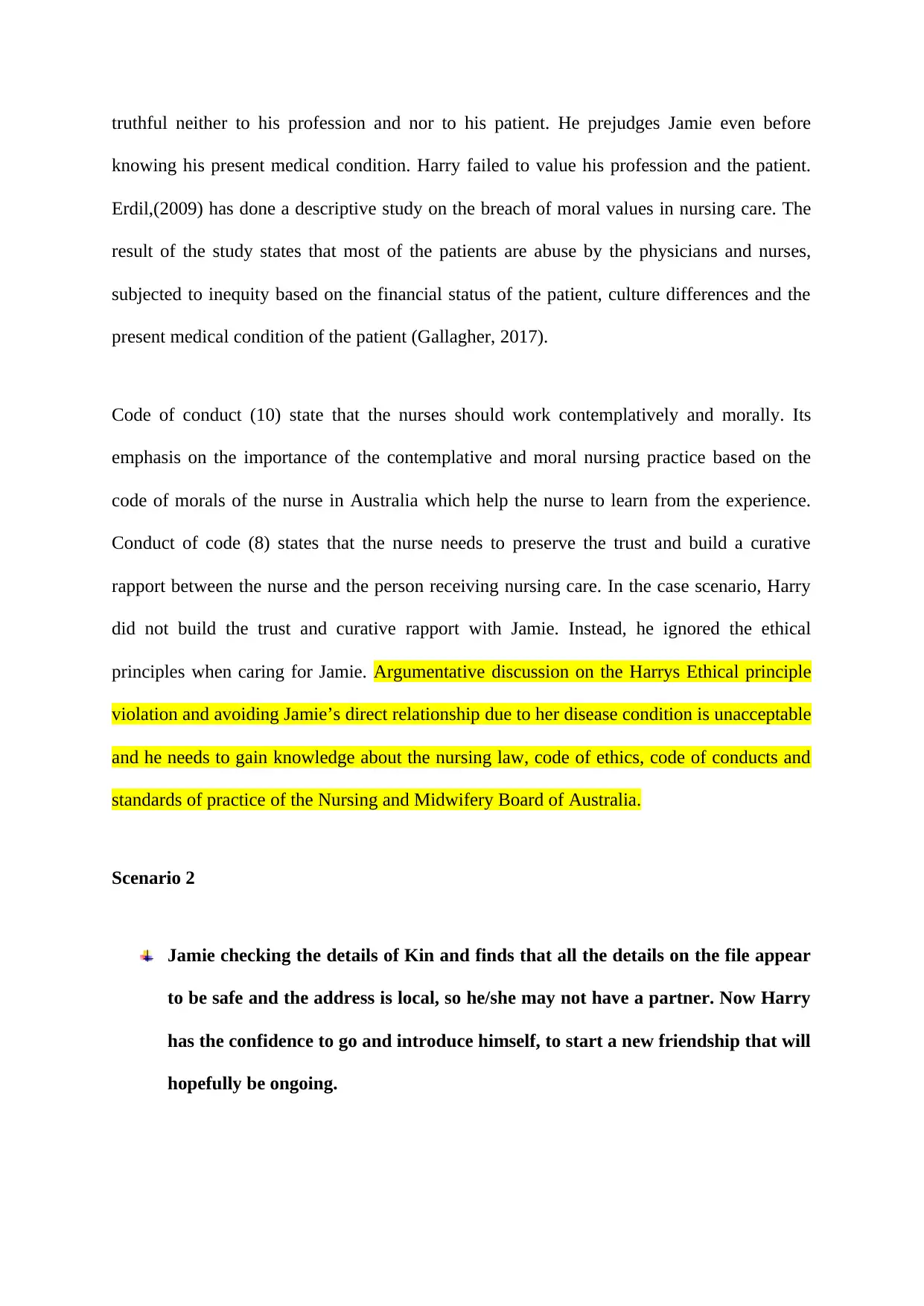
truthful neither to his profession and nor to his patient. He prejudges Jamie even before
knowing his present medical condition. Harry failed to value his profession and the patient.
Erdil,(2009) has done a descriptive study on the breach of moral values in nursing care. The
result of the study states that most of the patients are abuse by the physicians and nurses,
subjected to inequity based on the financial status of the patient, culture differences and the
present medical condition of the patient (Gallagher, 2017).
Code of conduct (10) state that the nurses should work contemplatively and morally. Its
emphasis on the importance of the contemplative and moral nursing practice based on the
code of morals of the nurse in Australia which help the nurse to learn from the experience.
Conduct of code (8) states that the nurse needs to preserve the trust and build a curative
rapport between the nurse and the person receiving nursing care. In the case scenario, Harry
did not build the trust and curative rapport with Jamie. Instead, he ignored the ethical
principles when caring for Jamie. Argumentative discussion on the Harrys Ethical principle
violation and avoiding Jamie’s direct relationship due to her disease condition is unacceptable
and he needs to gain knowledge about the nursing law, code of ethics, code of conducts and
standards of practice of the Nursing and Midwifery Board of Australia.
Scenario 2
Jamie checking the details of Kin and finds that all the details on the file appear
to be safe and the address is local, so he/she may not have a partner. Now Harry
has the confidence to go and introduce himself, to start a new friendship that will
hopefully be ongoing.
knowing his present medical condition. Harry failed to value his profession and the patient.
Erdil,(2009) has done a descriptive study on the breach of moral values in nursing care. The
result of the study states that most of the patients are abuse by the physicians and nurses,
subjected to inequity based on the financial status of the patient, culture differences and the
present medical condition of the patient (Gallagher, 2017).
Code of conduct (10) state that the nurses should work contemplatively and morally. Its
emphasis on the importance of the contemplative and moral nursing practice based on the
code of morals of the nurse in Australia which help the nurse to learn from the experience.
Conduct of code (8) states that the nurse needs to preserve the trust and build a curative
rapport between the nurse and the person receiving nursing care. In the case scenario, Harry
did not build the trust and curative rapport with Jamie. Instead, he ignored the ethical
principles when caring for Jamie. Argumentative discussion on the Harrys Ethical principle
violation and avoiding Jamie’s direct relationship due to her disease condition is unacceptable
and he needs to gain knowledge about the nursing law, code of ethics, code of conducts and
standards of practice of the Nursing and Midwifery Board of Australia.
Scenario 2
Jamie checking the details of Kin and finds that all the details on the file appear
to be safe and the address is local, so he/she may not have a partner. Now Harry
has the confidence to go and introduce himself, to start a new friendship that will
hopefully be ongoing.
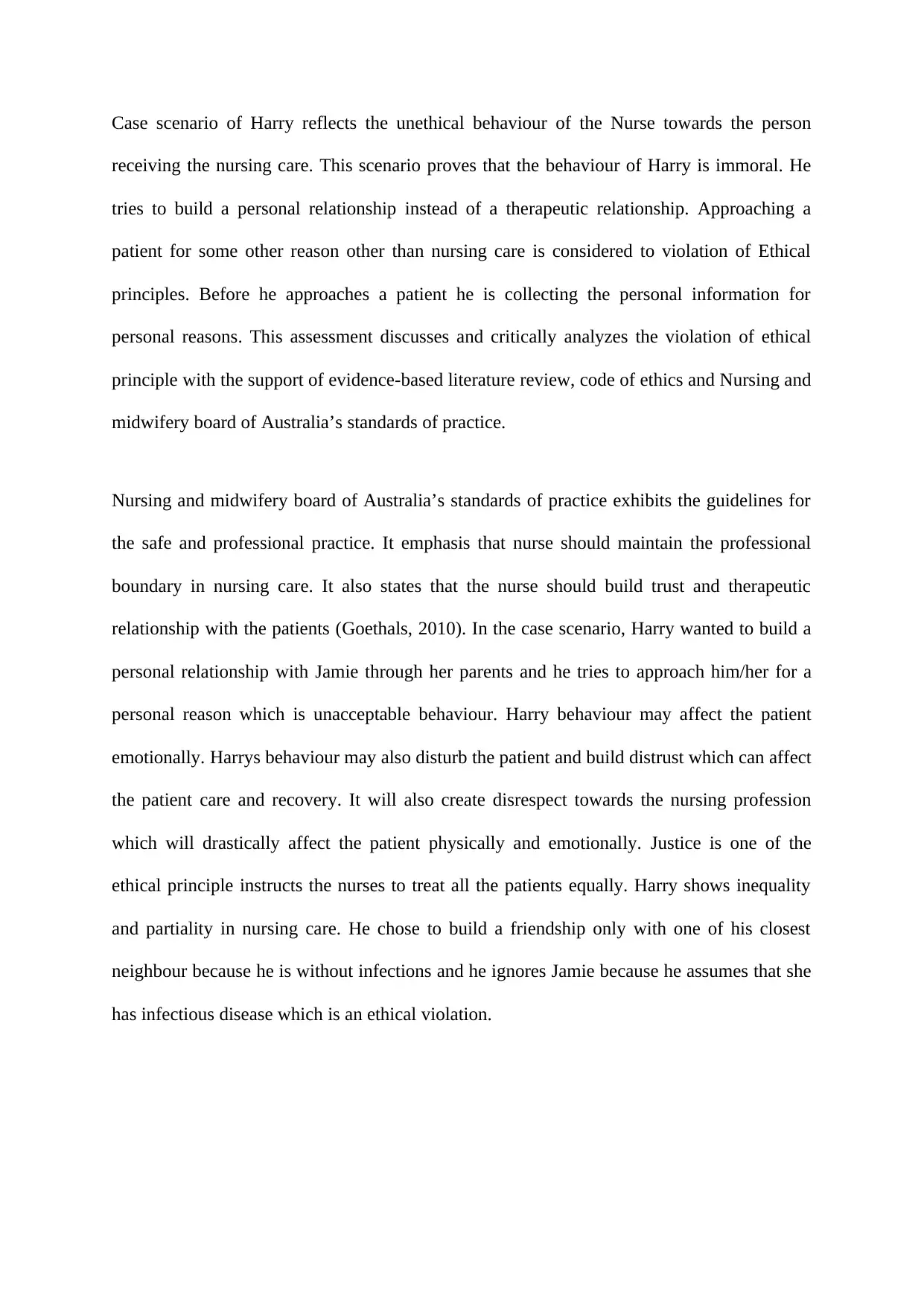
Case scenario of Harry reflects the unethical behaviour of the Nurse towards the person
receiving the nursing care. This scenario proves that the behaviour of Harry is immoral. He
tries to build a personal relationship instead of a therapeutic relationship. Approaching a
patient for some other reason other than nursing care is considered to violation of Ethical
principles. Before he approaches a patient he is collecting the personal information for
personal reasons. This assessment discusses and critically analyzes the violation of ethical
principle with the support of evidence-based literature review, code of ethics and Nursing and
midwifery board of Australia’s standards of practice.
Nursing and midwifery board of Australia’s standards of practice exhibits the guidelines for
the safe and professional practice. It emphasis that nurse should maintain the professional
boundary in nursing care. It also states that the nurse should build trust and therapeutic
relationship with the patients (Goethals, 2010). In the case scenario, Harry wanted to build a
personal relationship with Jamie through her parents and he tries to approach him/her for a
personal reason which is unacceptable behaviour. Harry behaviour may affect the patient
emotionally. Harrys behaviour may also disturb the patient and build distrust which can affect
the patient care and recovery. It will also create disrespect towards the nursing profession
which will drastically affect the patient physically and emotionally. Justice is one of the
ethical principle instructs the nurses to treat all the patients equally. Harry shows inequality
and partiality in nursing care. He chose to build a friendship only with one of his closest
neighbour because he is without infections and he ignores Jamie because he assumes that she
has infectious disease which is an ethical violation.
receiving the nursing care. This scenario proves that the behaviour of Harry is immoral. He
tries to build a personal relationship instead of a therapeutic relationship. Approaching a
patient for some other reason other than nursing care is considered to violation of Ethical
principles. Before he approaches a patient he is collecting the personal information for
personal reasons. This assessment discusses and critically analyzes the violation of ethical
principle with the support of evidence-based literature review, code of ethics and Nursing and
midwifery board of Australia’s standards of practice.
Nursing and midwifery board of Australia’s standards of practice exhibits the guidelines for
the safe and professional practice. It emphasis that nurse should maintain the professional
boundary in nursing care. It also states that the nurse should build trust and therapeutic
relationship with the patients (Goethals, 2010). In the case scenario, Harry wanted to build a
personal relationship with Jamie through her parents and he tries to approach him/her for a
personal reason which is unacceptable behaviour. Harry behaviour may affect the patient
emotionally. Harrys behaviour may also disturb the patient and build distrust which can affect
the patient care and recovery. It will also create disrespect towards the nursing profession
which will drastically affect the patient physically and emotionally. Justice is one of the
ethical principle instructs the nurses to treat all the patients equally. Harry shows inequality
and partiality in nursing care. He chose to build a friendship only with one of his closest
neighbour because he is without infections and he ignores Jamie because he assumes that she
has infectious disease which is an ethical violation.
Secure Best Marks with AI Grader
Need help grading? Try our AI Grader for instant feedback on your assignments.
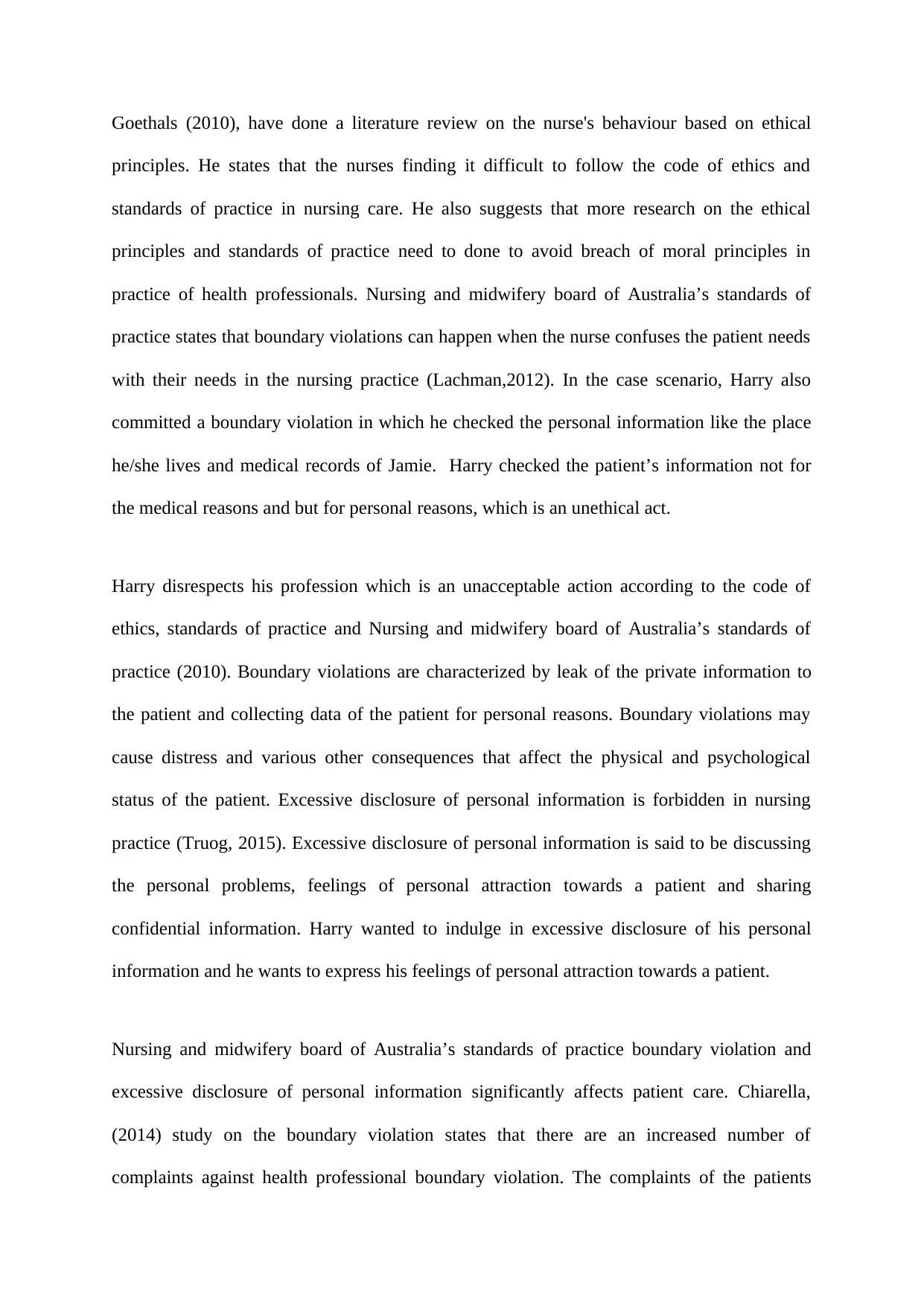
Goethals (2010), have done a literature review on the nurse's behaviour based on ethical
principles. He states that the nurses finding it difficult to follow the code of ethics and
standards of practice in nursing care. He also suggests that more research on the ethical
principles and standards of practice need to done to avoid breach of moral principles in
practice of health professionals. Nursing and midwifery board of Australia’s standards of
practice states that boundary violations can happen when the nurse confuses the patient needs
with their needs in the nursing practice (Lachman,2012). In the case scenario, Harry also
committed a boundary violation in which he checked the personal information like the place
he/she lives and medical records of Jamie. Harry checked the patient’s information not for
the medical reasons and but for personal reasons, which is an unethical act.
Harry disrespects his profession which is an unacceptable action according to the code of
ethics, standards of practice and Nursing and midwifery board of Australia’s standards of
practice (2010). Boundary violations are characterized by leak of the private information to
the patient and collecting data of the patient for personal reasons. Boundary violations may
cause distress and various other consequences that affect the physical and psychological
status of the patient. Excessive disclosure of personal information is forbidden in nursing
practice (Truog, 2015). Excessive disclosure of personal information is said to be discussing
the personal problems, feelings of personal attraction towards a patient and sharing
confidential information. Harry wanted to indulge in excessive disclosure of his personal
information and he wants to express his feelings of personal attraction towards a patient.
Nursing and midwifery board of Australia’s standards of practice boundary violation and
excessive disclosure of personal information significantly affects patient care. Chiarella,
(2014) study on the boundary violation states that there are an increased number of
complaints against health professional boundary violation. The complaints of the patients
principles. He states that the nurses finding it difficult to follow the code of ethics and
standards of practice in nursing care. He also suggests that more research on the ethical
principles and standards of practice need to done to avoid breach of moral principles in
practice of health professionals. Nursing and midwifery board of Australia’s standards of
practice states that boundary violations can happen when the nurse confuses the patient needs
with their needs in the nursing practice (Lachman,2012). In the case scenario, Harry also
committed a boundary violation in which he checked the personal information like the place
he/she lives and medical records of Jamie. Harry checked the patient’s information not for
the medical reasons and but for personal reasons, which is an unethical act.
Harry disrespects his profession which is an unacceptable action according to the code of
ethics, standards of practice and Nursing and midwifery board of Australia’s standards of
practice (2010). Boundary violations are characterized by leak of the private information to
the patient and collecting data of the patient for personal reasons. Boundary violations may
cause distress and various other consequences that affect the physical and psychological
status of the patient. Excessive disclosure of personal information is forbidden in nursing
practice (Truog, 2015). Excessive disclosure of personal information is said to be discussing
the personal problems, feelings of personal attraction towards a patient and sharing
confidential information. Harry wanted to indulge in excessive disclosure of his personal
information and he wants to express his feelings of personal attraction towards a patient.
Nursing and midwifery board of Australia’s standards of practice boundary violation and
excessive disclosure of personal information significantly affects patient care. Chiarella,
(2014) study on the boundary violation states that there are an increased number of
complaints against health professional boundary violation. The complaints of the patients
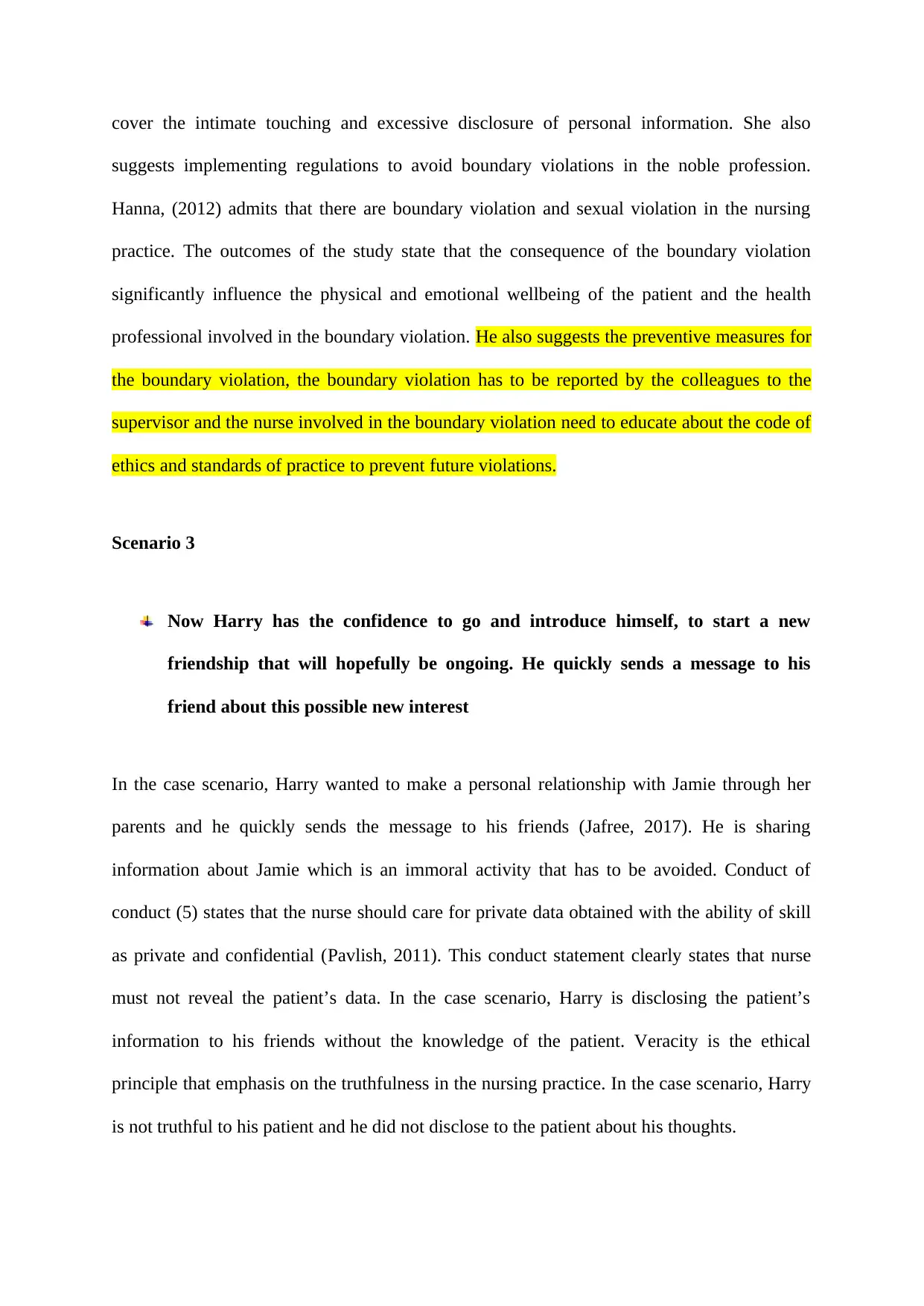
cover the intimate touching and excessive disclosure of personal information. She also
suggests implementing regulations to avoid boundary violations in the noble profession.
Hanna, (2012) admits that there are boundary violation and sexual violation in the nursing
practice. The outcomes of the study state that the consequence of the boundary violation
significantly influence the physical and emotional wellbeing of the patient and the health
professional involved in the boundary violation. He also suggests the preventive measures for
the boundary violation, the boundary violation has to be reported by the colleagues to the
supervisor and the nurse involved in the boundary violation need to educate about the code of
ethics and standards of practice to prevent future violations.
Scenario 3
Now Harry has the confidence to go and introduce himself, to start a new
friendship that will hopefully be ongoing. He quickly sends a message to his
friend about this possible new interest
In the case scenario, Harry wanted to make a personal relationship with Jamie through her
parents and he quickly sends the message to his friends (Jafree, 2017). He is sharing
information about Jamie which is an immoral activity that has to be avoided. Conduct of
conduct (5) states that the nurse should care for private data obtained with the ability of skill
as private and confidential (Pavlish, 2011). This conduct statement clearly states that nurse
must not reveal the patient’s data. In the case scenario, Harry is disclosing the patient’s
information to his friends without the knowledge of the patient. Veracity is the ethical
principle that emphasis on the truthfulness in the nursing practice. In the case scenario, Harry
is not truthful to his patient and he did not disclose to the patient about his thoughts.
suggests implementing regulations to avoid boundary violations in the noble profession.
Hanna, (2012) admits that there are boundary violation and sexual violation in the nursing
practice. The outcomes of the study state that the consequence of the boundary violation
significantly influence the physical and emotional wellbeing of the patient and the health
professional involved in the boundary violation. He also suggests the preventive measures for
the boundary violation, the boundary violation has to be reported by the colleagues to the
supervisor and the nurse involved in the boundary violation need to educate about the code of
ethics and standards of practice to prevent future violations.
Scenario 3
Now Harry has the confidence to go and introduce himself, to start a new
friendship that will hopefully be ongoing. He quickly sends a message to his
friend about this possible new interest
In the case scenario, Harry wanted to make a personal relationship with Jamie through her
parents and he quickly sends the message to his friends (Jafree, 2017). He is sharing
information about Jamie which is an immoral activity that has to be avoided. Conduct of
conduct (5) states that the nurse should care for private data obtained with the ability of skill
as private and confidential (Pavlish, 2011). This conduct statement clearly states that nurse
must not reveal the patient’s data. In the case scenario, Harry is disclosing the patient’s
information to his friends without the knowledge of the patient. Veracity is the ethical
principle that emphasis on the truthfulness in the nursing practice. In the case scenario, Harry
is not truthful to his patient and he did not disclose to the patient about his thoughts.
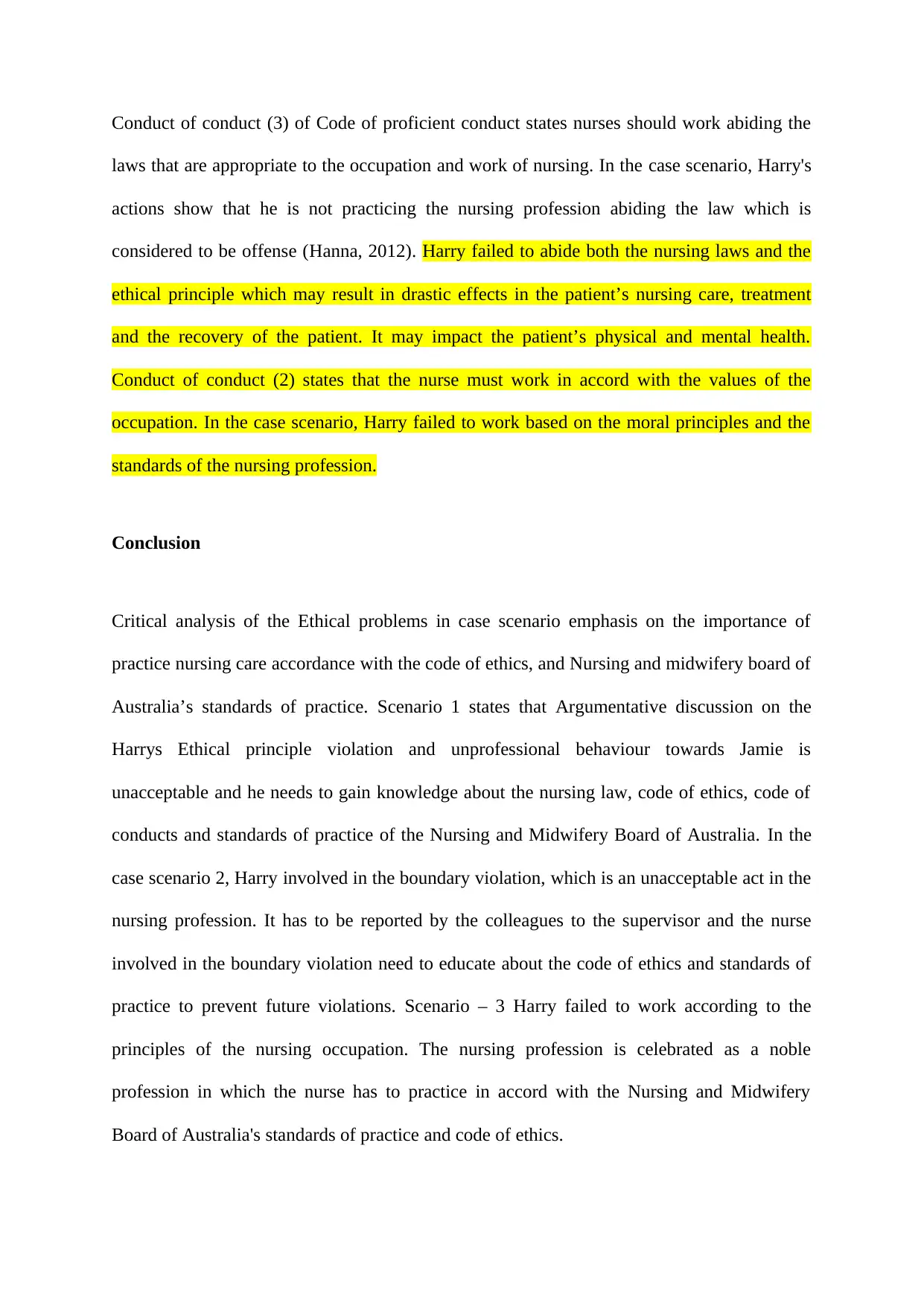
Conduct of conduct (3) of Code of proficient conduct states nurses should work abiding the
laws that are appropriate to the occupation and work of nursing. In the case scenario, Harry's
actions show that he is not practicing the nursing profession abiding the law which is
considered to be offense (Hanna, 2012). Harry failed to abide both the nursing laws and the
ethical principle which may result in drastic effects in the patient’s nursing care, treatment
and the recovery of the patient. It may impact the patient’s physical and mental health.
Conduct of conduct (2) states that the nurse must work in accord with the values of the
occupation. In the case scenario, Harry failed to work based on the moral principles and the
standards of the nursing profession.
Conclusion
Critical analysis of the Ethical problems in case scenario emphasis on the importance of
practice nursing care accordance with the code of ethics, and Nursing and midwifery board of
Australia’s standards of practice. Scenario 1 states that Argumentative discussion on the
Harrys Ethical principle violation and unprofessional behaviour towards Jamie is
unacceptable and he needs to gain knowledge about the nursing law, code of ethics, code of
conducts and standards of practice of the Nursing and Midwifery Board of Australia. In the
case scenario 2, Harry involved in the boundary violation, which is an unacceptable act in the
nursing profession. It has to be reported by the colleagues to the supervisor and the nurse
involved in the boundary violation need to educate about the code of ethics and standards of
practice to prevent future violations. Scenario – 3 Harry failed to work according to the
principles of the nursing occupation. The nursing profession is celebrated as a noble
profession in which the nurse has to practice in accord with the Nursing and Midwifery
Board of Australia's standards of practice and code of ethics.
laws that are appropriate to the occupation and work of nursing. In the case scenario, Harry's
actions show that he is not practicing the nursing profession abiding the law which is
considered to be offense (Hanna, 2012). Harry failed to abide both the nursing laws and the
ethical principle which may result in drastic effects in the patient’s nursing care, treatment
and the recovery of the patient. It may impact the patient’s physical and mental health.
Conduct of conduct (2) states that the nurse must work in accord with the values of the
occupation. In the case scenario, Harry failed to work based on the moral principles and the
standards of the nursing profession.
Conclusion
Critical analysis of the Ethical problems in case scenario emphasis on the importance of
practice nursing care accordance with the code of ethics, and Nursing and midwifery board of
Australia’s standards of practice. Scenario 1 states that Argumentative discussion on the
Harrys Ethical principle violation and unprofessional behaviour towards Jamie is
unacceptable and he needs to gain knowledge about the nursing law, code of ethics, code of
conducts and standards of practice of the Nursing and Midwifery Board of Australia. In the
case scenario 2, Harry involved in the boundary violation, which is an unacceptable act in the
nursing profession. It has to be reported by the colleagues to the supervisor and the nurse
involved in the boundary violation need to educate about the code of ethics and standards of
practice to prevent future violations. Scenario – 3 Harry failed to work according to the
principles of the nursing occupation. The nursing profession is celebrated as a noble
profession in which the nurse has to practice in accord with the Nursing and Midwifery
Board of Australia's standards of practice and code of ethics.
Paraphrase This Document
Need a fresh take? Get an instant paraphrase of this document with our AI Paraphraser
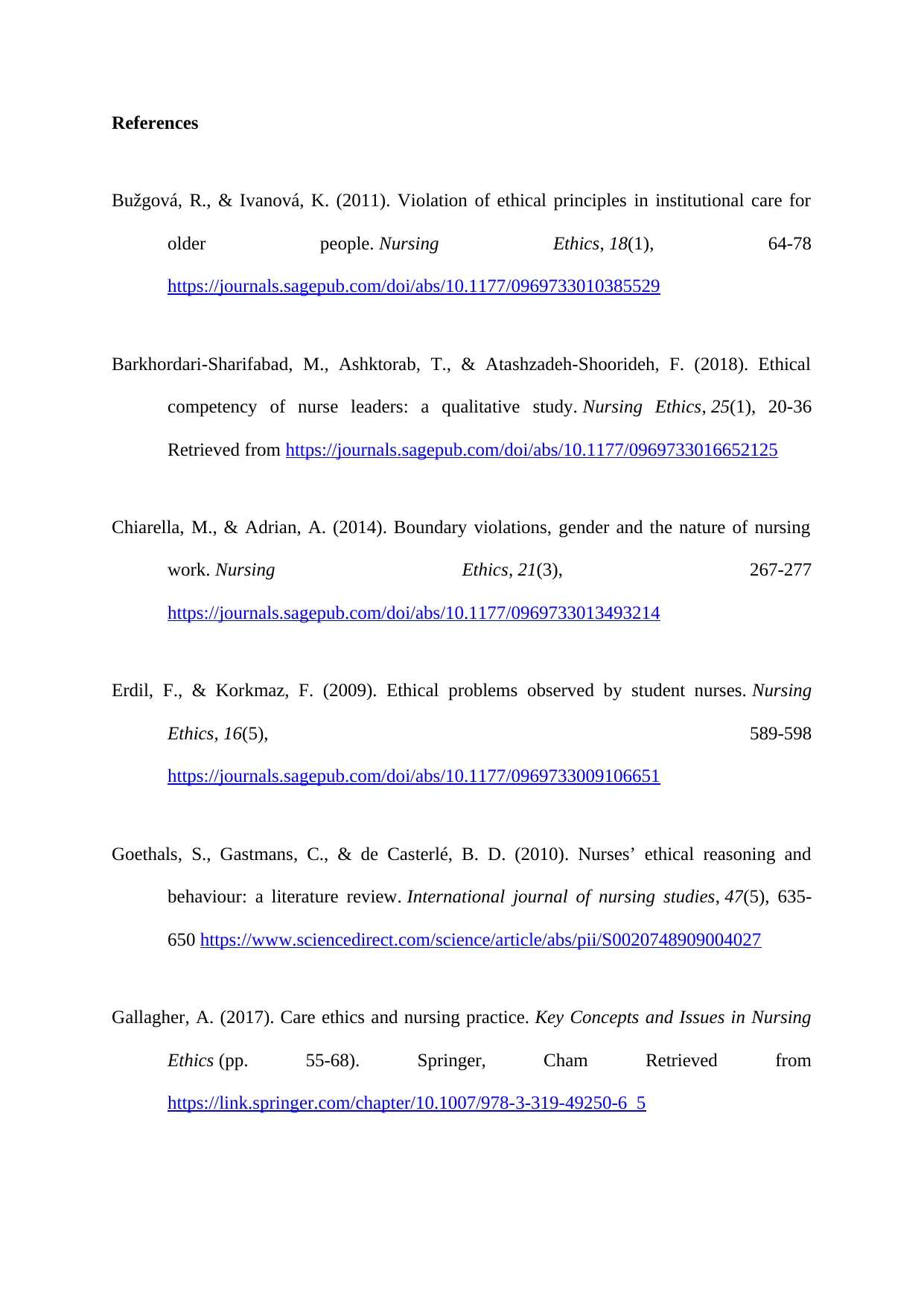
References
Bužgová, R., & Ivanová, K. (2011). Violation of ethical principles in institutional care for
older people. Nursing Ethics, 18(1), 64-78
https://journals.sagepub.com/doi/abs/10.1177/0969733010385529
Barkhordari-Sharifabad, M., Ashktorab, T., & Atashzadeh-Shoorideh, F. (2018). Ethical
competency of nurse leaders: a qualitative study. Nursing Ethics, 25(1), 20-36
Retrieved from https://journals.sagepub.com/doi/abs/10.1177/0969733016652125
Chiarella, M., & Adrian, A. (2014). Boundary violations, gender and the nature of nursing
work. Nursing Ethics, 21(3), 267-277
https://journals.sagepub.com/doi/abs/10.1177/0969733013493214
Erdil, F., & Korkmaz, F. (2009). Ethical problems observed by student nurses. Nursing
Ethics, 16(5), 589-598
https://journals.sagepub.com/doi/abs/10.1177/0969733009106651
Goethals, S., Gastmans, C., & de Casterlé, B. D. (2010). Nurses’ ethical reasoning and
behaviour: a literature review. International journal of nursing studies, 47(5), 635-
650 https://www.sciencedirect.com/science/article/abs/pii/S0020748909004027
Gallagher, A. (2017). Care ethics and nursing practice. Key Concepts and Issues in Nursing
Ethics (pp. 55-68). Springer, Cham Retrieved from
https://link.springer.com/chapter/10.1007/978-3-319-49250-6_5
Bužgová, R., & Ivanová, K. (2011). Violation of ethical principles in institutional care for
older people. Nursing Ethics, 18(1), 64-78
https://journals.sagepub.com/doi/abs/10.1177/0969733010385529
Barkhordari-Sharifabad, M., Ashktorab, T., & Atashzadeh-Shoorideh, F. (2018). Ethical
competency of nurse leaders: a qualitative study. Nursing Ethics, 25(1), 20-36
Retrieved from https://journals.sagepub.com/doi/abs/10.1177/0969733016652125
Chiarella, M., & Adrian, A. (2014). Boundary violations, gender and the nature of nursing
work. Nursing Ethics, 21(3), 267-277
https://journals.sagepub.com/doi/abs/10.1177/0969733013493214
Erdil, F., & Korkmaz, F. (2009). Ethical problems observed by student nurses. Nursing
Ethics, 16(5), 589-598
https://journals.sagepub.com/doi/abs/10.1177/0969733009106651
Goethals, S., Gastmans, C., & de Casterlé, B. D. (2010). Nurses’ ethical reasoning and
behaviour: a literature review. International journal of nursing studies, 47(5), 635-
650 https://www.sciencedirect.com/science/article/abs/pii/S0020748909004027
Gallagher, A. (2017). Care ethics and nursing practice. Key Concepts and Issues in Nursing
Ethics (pp. 55-68). Springer, Cham Retrieved from
https://link.springer.com/chapter/10.1007/978-3-319-49250-6_5
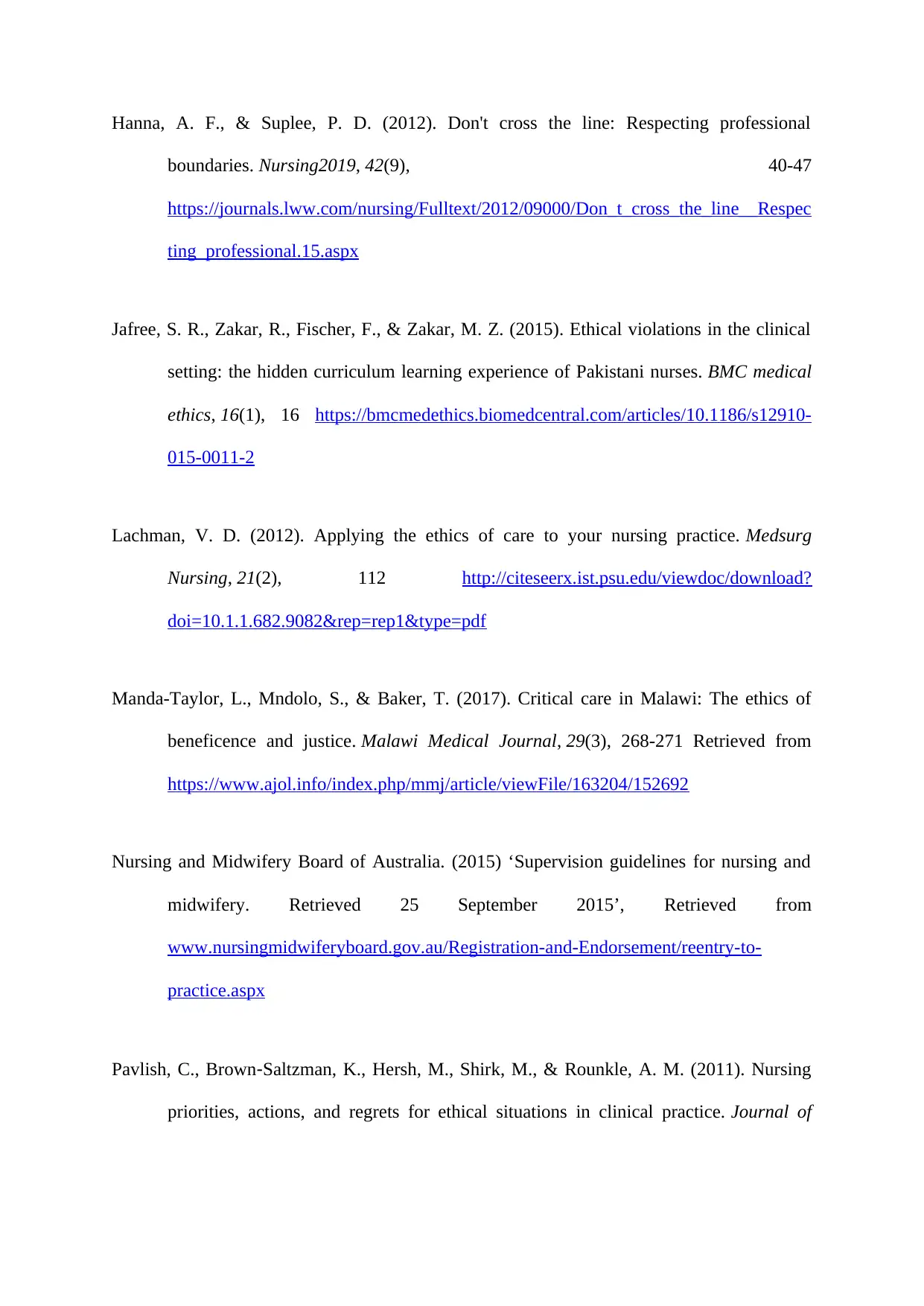
Hanna, A. F., & Suplee, P. D. (2012). Don't cross the line: Respecting professional
boundaries. Nursing2019, 42(9), 40-47
https://journals.lww.com/nursing/Fulltext/2012/09000/Don_t_cross_the_line__Respec
ting_professional.15.aspx
Jafree, S. R., Zakar, R., Fischer, F., & Zakar, M. Z. (2015). Ethical violations in the clinical
setting: the hidden curriculum learning experience of Pakistani nurses. BMC medical
ethics, 16(1), 16 https://bmcmedethics.biomedcentral.com/articles/10.1186/s12910-
015-0011-2
Lachman, V. D. (2012). Applying the ethics of care to your nursing practice. Medsurg
Nursing, 21(2), 112 http://citeseerx.ist.psu.edu/viewdoc/download?
doi=10.1.1.682.9082&rep=rep1&type=pdf
Manda-Taylor, L., Mndolo, S., & Baker, T. (2017). Critical care in Malawi: The ethics of
beneficence and justice. Malawi Medical Journal, 29(3), 268-271 Retrieved from
https://www.ajol.info/index.php/mmj/article/viewFile/163204/152692
Nursing and Midwifery Board of Australia. (2015) ‘Supervision guidelines for nursing and
midwifery. Retrieved 25 September 2015’, Retrieved from
www.nursingmidwiferyboard.gov.au/Registration-and-Endorsement/reentry-to-
practice.aspx
Pavlish, C., Brown‐Saltzman, K., Hersh, M., Shirk, M., & Rounkle, A. M. (2011). Nursing
priorities, actions, and regrets for ethical situations in clinical practice. Journal of
boundaries. Nursing2019, 42(9), 40-47
https://journals.lww.com/nursing/Fulltext/2012/09000/Don_t_cross_the_line__Respec
ting_professional.15.aspx
Jafree, S. R., Zakar, R., Fischer, F., & Zakar, M. Z. (2015). Ethical violations in the clinical
setting: the hidden curriculum learning experience of Pakistani nurses. BMC medical
ethics, 16(1), 16 https://bmcmedethics.biomedcentral.com/articles/10.1186/s12910-
015-0011-2
Lachman, V. D. (2012). Applying the ethics of care to your nursing practice. Medsurg
Nursing, 21(2), 112 http://citeseerx.ist.psu.edu/viewdoc/download?
doi=10.1.1.682.9082&rep=rep1&type=pdf
Manda-Taylor, L., Mndolo, S., & Baker, T. (2017). Critical care in Malawi: The ethics of
beneficence and justice. Malawi Medical Journal, 29(3), 268-271 Retrieved from
https://www.ajol.info/index.php/mmj/article/viewFile/163204/152692
Nursing and Midwifery Board of Australia. (2015) ‘Supervision guidelines for nursing and
midwifery. Retrieved 25 September 2015’, Retrieved from
www.nursingmidwiferyboard.gov.au/Registration-and-Endorsement/reentry-to-
practice.aspx
Pavlish, C., Brown‐Saltzman, K., Hersh, M., Shirk, M., & Rounkle, A. M. (2011). Nursing
priorities, actions, and regrets for ethical situations in clinical practice. Journal of
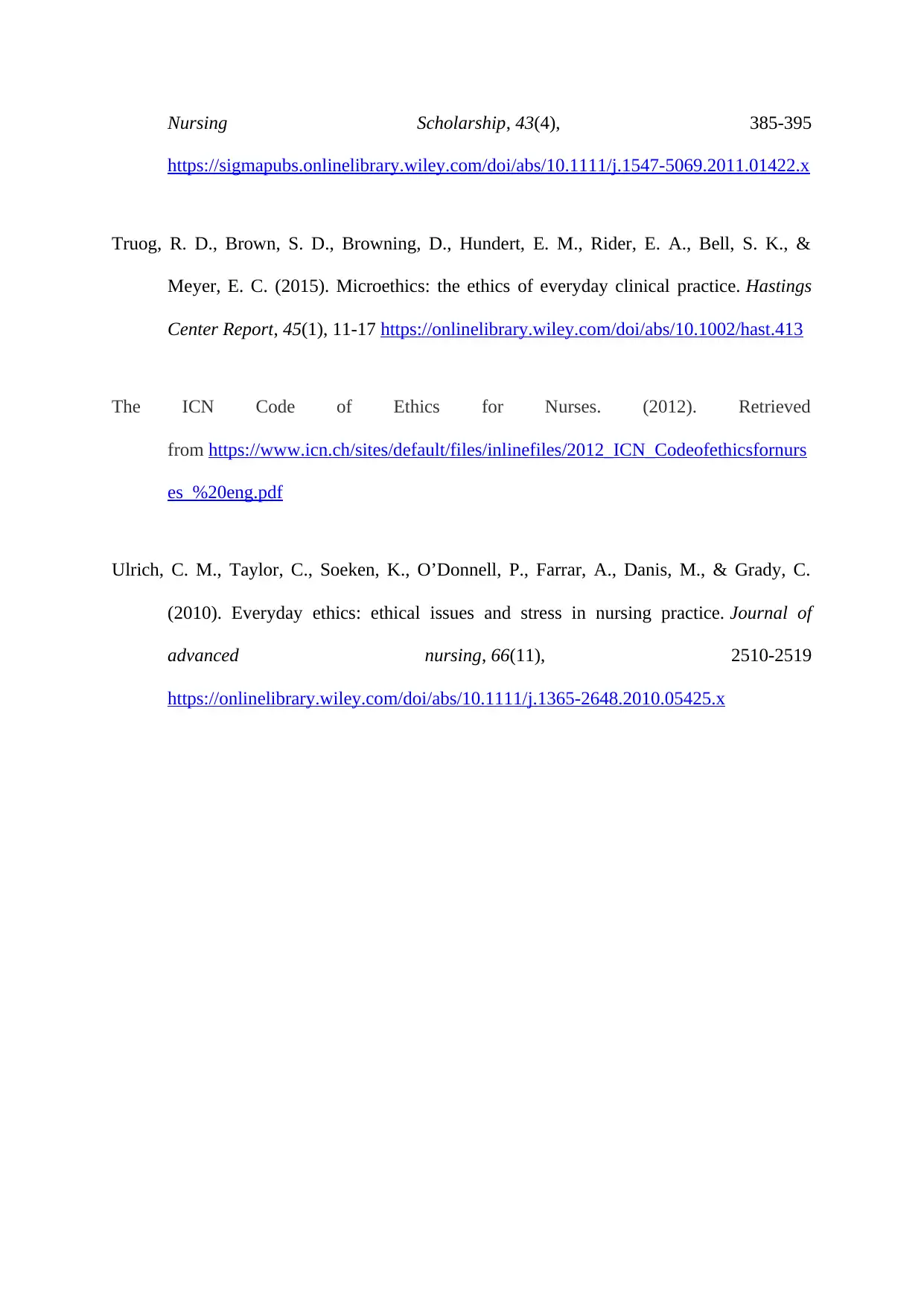
Nursing Scholarship, 43(4), 385-395
https://sigmapubs.onlinelibrary.wiley.com/doi/abs/10.1111/j.1547-5069.2011.01422.x
Truog, R. D., Brown, S. D., Browning, D., Hundert, E. M., Rider, E. A., Bell, S. K., &
Meyer, E. C. (2015). Microethics: the ethics of everyday clinical practice. Hastings
Center Report, 45(1), 11-17 https://onlinelibrary.wiley.com/doi/abs/10.1002/hast.413
The ICN Code of Ethics for Nurses. (2012). Retrieved
from https://www.icn.ch/sites/default/files/inlinefiles/2012_ICN_Codeofethicsfornurs
es_%20eng.pdf
Ulrich, C. M., Taylor, C., Soeken, K., O’Donnell, P., Farrar, A., Danis, M., & Grady, C.
(2010). Everyday ethics: ethical issues and stress in nursing practice. Journal of
advanced nursing, 66(11), 2510-2519
https://onlinelibrary.wiley.com/doi/abs/10.1111/j.1365-2648.2010.05425.x
https://sigmapubs.onlinelibrary.wiley.com/doi/abs/10.1111/j.1547-5069.2011.01422.x
Truog, R. D., Brown, S. D., Browning, D., Hundert, E. M., Rider, E. A., Bell, S. K., &
Meyer, E. C. (2015). Microethics: the ethics of everyday clinical practice. Hastings
Center Report, 45(1), 11-17 https://onlinelibrary.wiley.com/doi/abs/10.1002/hast.413
The ICN Code of Ethics for Nurses. (2012). Retrieved
from https://www.icn.ch/sites/default/files/inlinefiles/2012_ICN_Codeofethicsfornurs
es_%20eng.pdf
Ulrich, C. M., Taylor, C., Soeken, K., O’Donnell, P., Farrar, A., Danis, M., & Grady, C.
(2010). Everyday ethics: ethical issues and stress in nursing practice. Journal of
advanced nursing, 66(11), 2510-2519
https://onlinelibrary.wiley.com/doi/abs/10.1111/j.1365-2648.2010.05425.x
Secure Best Marks with AI Grader
Need help grading? Try our AI Grader for instant feedback on your assignments.

1 out of 11
Related Documents
Your All-in-One AI-Powered Toolkit for Academic Success.
+13062052269
info@desklib.com
Available 24*7 on WhatsApp / Email
![[object Object]](/_next/static/media/star-bottom.7253800d.svg)
Unlock your academic potential
© 2024 | Zucol Services PVT LTD | All rights reserved.





